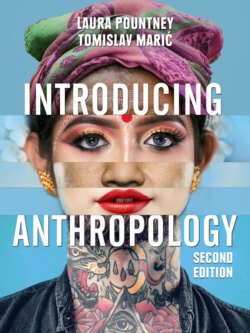Читать книгу Introducing Anthropology - Laura Pountney - Страница 62
Key terms
Оглавлениеaltruism The ability to put the needs of others before your own
Anthropocene A new planetary era in which humans have become the dominant force in shaping the earth’s physical make-up and processes
bipedalism Walking upright on two feet for the majority of time
catastrophism The theory that the Earth has been affected in the past by sudden, short-lived, violent events, possibly worldwide in scope, which have led to the contemporary world with its current variety of animals and plants
creationism The belief that all life was created by the actions of God
cultural evolution The ways in which humans have evolved beyond their biology
culturally constructed Something which is created by society
endemic dwarfism A process whereby some creatures confined to isolated habitats such as islands are known to have become smaller
Enlightenment A period in Europe during the eighteenth century when there were many scientific discoveries that contradicted the accepted teachings of those in authority, notably the Church
evolution Any change across successive generations in the inherited characteristics of biological populations
fossil The preserved remains or traces of animals, plants and other organisms from the remote past
hominins Primates, species who are closely related to human beings or who are regarded as human
hunter-gatherers Members of a nomadic people who live chiefly by hunting and fishing and harvesting wild food
intelligent design Also known as neo-creationism, the belief that the current state of life on Earth has come about through the actions of an intelligent designer; this designer need not be God, but most proponents of intelligent design seem to have God in mind
mammal Any warm-blooded vertebrate animal, including humans, characterized by a covering of hair on the skin and, in the female, milk-producing mammary glands for feeding the young
natural selection The process in nature by which, according to Darwin’s theory of evolution, only the organisms best adapted to their environment tend to survive and transmit their genetic characteristics in increasing numbers to succeeding generations, while those less well adapted tend to be eliminated
omnivorous Ability to eat and survive on both plant and animal matter
opposable thumb A thumb that is sufficiently separate from the other fingers of the hand to allow for precision grip
paleoanthropology The study of extinct early primates and fossil remains of early primates
paleontology The study of life on earth, often drawing on information provided by fossils
primate A mammal of the order Primates, characterized, for example, by refined development of the hands and feet and a large brain
racism Discrimination against an individual or group based on their perceived ethnicity and the idea that ‘race’ is a fixed and bounded reality
sexual dimorphism This refers to both the internal and the external differences between males and females found in a variety of animals and plants
sociobiology An area of biology that aims to explain social behaviour in terms of evolution
symbol Something that is used to represent an idea or object
taxonomy The classification of organisms in an ordered system that indicates natural relationships
